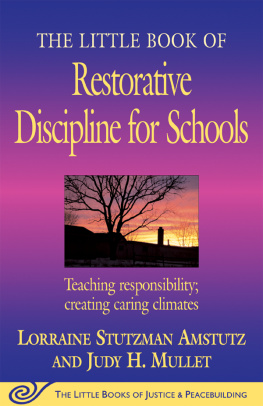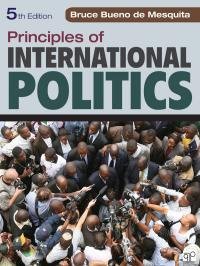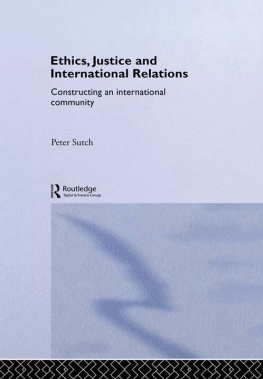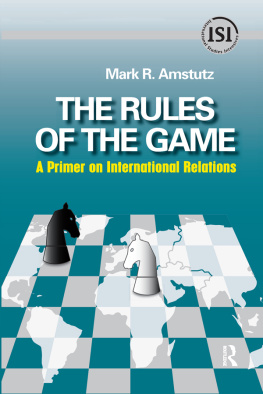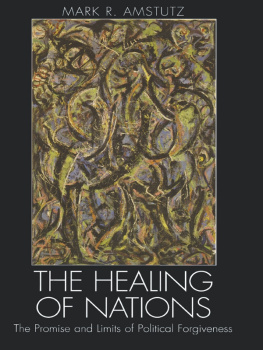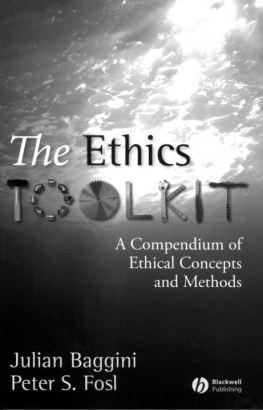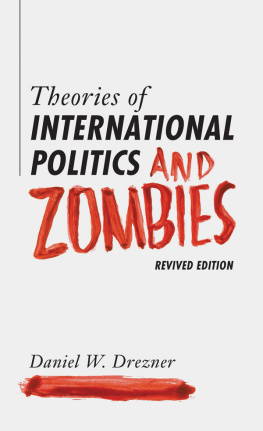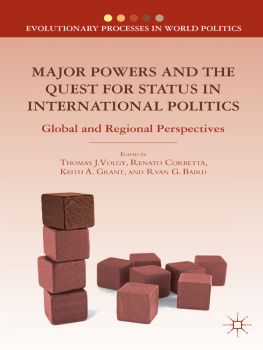Amstutz - International ethics: concepts, theories, and cases in global politics
Here you can read online Amstutz - International ethics: concepts, theories, and cases in global politics full text of the book (entire story) in english for free. Download pdf and epub, get meaning, cover and reviews about this ebook. City: Lanham, year: 2013, publisher: Rowman & Littlefield Publishers, Inc, genre: Politics. Description of the work, (preface) as well as reviews are available. Best literature library LitArk.com created for fans of good reading and offers a wide selection of genres:
Romance novel
Science fiction
Adventure
Detective
Science
History
Home and family
Prose
Art
Politics
Computer
Non-fiction
Religion
Business
Children
Humor
Choose a favorite category and find really read worthwhile books. Enjoy immersion in the world of imagination, feel the emotions of the characters or learn something new for yourself, make an fascinating discovery.

International ethics: concepts, theories, and cases in global politics: summary, description and annotation
We offer to read an annotation, description, summary or preface (depends on what the author of the book "International ethics: concepts, theories, and cases in global politics" wrote himself). If you haven't found the necessary information about the book — write in the comments, we will try to find it.
Amstutz: author's other books
Who wrote International ethics: concepts, theories, and cases in global politics? Find out the surname, the name of the author of the book and a list of all author's works by series.
International ethics: concepts, theories, and cases in global politics — read online for free the complete book (whole text) full work
Below is the text of the book, divided by pages. System saving the place of the last page read, allows you to conveniently read the book "International ethics: concepts, theories, and cases in global politics" online for free, without having to search again every time where you left off. Put a bookmark, and you can go to the page where you finished reading at any time.
Font size:
Interval:
Bookmark:
International Ethics
Concepts, Theories, and Cases in Global Politics
FOURTH EDITION
Mark R. Amstutz
ROWMAN & LITTLEFIELD PUBLISHERS, INC.
Lanham Boulder New York Toronto Plymouth, UK
Published by Rowman & Littlefield Publishers, Inc.
A wholly owned subsidiary of The Rowman & Littlefield Publishing Group, Inc.
4501 Forbes Boulevard, Suite 200, Lanham, Maryland 20706
www.rowman.com
10 Thornbury Road, Plymouth PL6 7PP, United Kingdom
Copyright 2013 by Rowman & Littlefield Publishers, Inc.
All rights reserved. No part of this book may be reproduced in any form or by any electronic or mechanical means, including information storage and retrieval systems, without written permission from the publisher, except by a reviewer who may quote passages in a review.
British Library Cataloguing in Publication Information Available
Library of Congress Cataloging-in-Publication Data
Amstutz, Mark R.
International ethics : concepts, theories, and cases in global politics / Mark R.
Amstutz.Fourth edition.
pages cm
Includes bibliographical references and index.
ISBN 978-1-4422-2095-9 (cloth : alk. paper)
ISBN 978-1-4422-2096-6 (pbk. : alk. paper)
ISBN 978-1-4422-2097-3 (electronic)
1. International relationsMoral and ethical aspects. I. Title.
JZ1306.A67 2013
172.4dc23
2012044978
 The paper used in this publication meets the minimum requirements of American National Standard for Information SciencesPermanence of Paper for Printed Library Materials, ANSI/NISO Z39.48-1992.
The paper used in this publication meets the minimum requirements of American National Standard for Information SciencesPermanence of Paper for Printed Library Materials, ANSI/NISO Z39.48-1992.
Printed in the United States of America
The place of morality in international politics is the most obscure and difficult problem in the whole range of international studies.
EDWARD HALLETT CARR
A FUNDAMENTAL AIM of this study is to demonstrate, through arguments and illustrations, that moral values are an essential element of international relations and that international ethics are foundational to global politics. Although international relations scholars have increasingly recognized the importance of moral values and ethical reasoning in international affairs, political realism continues to serve as the dominant paradigm in international relations. Even though realism does not deny international ethics, it allows little room for moral reasoning, focusing instead on the quest for national security and the promotion of economic and social well-being.
In this book, I argue that the realist notion that international politics is fundamentally a quest for political power and economic interests is false and untenable. Instead, I suggest that international politics is rooted in ethics and that states and other nonstate actors share a basic moral vocabulary that influences the individual and collective choices of states. To be sure, the ethical analysis of foreign policies and global structures is fraught with major epistemological and methodological challenges. However, the difficulty of applying moral principles to concrete issues and problems does not invalidate the possibility of or the responsibility for morally assessing political actions and institutional structures.
Realists assert that international society is a realm of power and necessity, not morality and choice. Because no common authority exists in the international system to protect states and to resolve disputes, some political thinkers have suggested that states overriding interests are national security and material well-being. These interests, it is suggested, automatically displace morality. George Kennan, for example, argues that because a statesmans primary duty is to secure the vital interests of states, foreign affairs are essentially amoral. He writes,
Government is an agent, not a principal. Its primary obligation is to the interests of the national society it represents... its military security, the integrity of its political life and the well-being of its people. These needs have no moral quality. They are
Kennan thinks that because interests such as security, political independence, and national well-being are essential to the survival and economic viability of states, they have no moral quality. But why should vital interests be amoral? Are not human interests rooted partly in morality? And does not the pursuit of foreign policy goals involve moral judgment? As Arnold Wolfers has wisely observed, international relations are not beyond the scope of morality but are themselves based on moral norms.
A brief perusal of contemporary international developments illustrates the pervasive and influential role of moral values in the foreign policy debates, if not actions, of government officials. Consider the following events, each of them involving important moral norms:
1. On September 11, 2001, Muslim fanatics commandeered four large passenger airplanes, flying two of them into the World Trade Center in New York City and another into the Pentagon in Washington, D.C. These attacks, which led to the collapse of the World Trade Centers twin towers and major destruction to a section of the Pentagon, caused the death of more than three thousand persons. They were the single most destructive act of aggression against the territory of the United States, eclipsing the destruction caused by the Japanese attack on Pearl Harbor in 1941. The U.S. government responded to the 9/11 attacks with a war on terror. When Afghanistans ruling authorities, the Taliban, refused to turn over Osama bin Laden and other Al Qaeda operatives that were partly responsible for the 9/11 terrorist attack, U.S. military forces intervened and toppled the Taliban regime. In view of the danger posed by contemporary terrorism, was the U.S. military action against Afghanistan justified? Is war against states harboring terrorist organizations morally legitimate, even if they are not directly responsible for terror?
2. From 2003 until 2007 an intense war took place in Darfur, Sudan, between rebels demanding greater political autonomy and government-backed militia (janjaweed). The Darfur rebels were African tribesmen who survived as farmers, while the militia were mainly nomadic Arab herdsmen. When the Darfur rebellion began, Sudans government responded by arming and supporting the janjaweed and carrying out periodic military operations on land and from the air. The war is estimated to have resulted in the deaths of more than two hundred thousand Darfurians and the forced displacement of more than two million other persons. Although the U.S. government charged Sudans regime with genocide, the international community was unwilling to use military force to protect the innocent. In 2005 a small, ineffective African peacekeeping force was introduced into the territory, but it was unable to halt atrocities. Finally, a UN peacekeeping force was established in 2007 that significantly reduced violence in Darfur. When domestic conflicts like the Darfur war occur, resulting in widespread killing and suffering among innocent civilians, should the international community intervene to restore order? When fighters target civilians directly, who should rescue them?
3. Following the 9/11 attacks on the United States, Pakistan cooperated with the U.S. military in the campaign against Al Qaeda and the Taliban, receiving close to $30 billion in foreign aid from America. But in time cooperation dwindled, and the bilateral ties became increasingly strained after the U.S. military increased attacks on militant groups in the semiautonomous tribal areas of Western Pakistan in the 20092011 period. Although most of these attacks were carried out against specific targets with highly accurate drone missiles, the attacks posed numerous legal and moral challenges, including the violation of Pakistans sovereignty and the inevitable deaths of civilians. Two events in 2011 increased tensions significantly. First, U.S. special forces located and killed Al Qaeda founder Osama bin Laden in a covert mission deep in Pakistani territory in May 2011, embarrassing Pakistans armed forces both with the revelation that the most sought-after terrorist had been living in their land for more than five years and also with their failure to detect the American violation of Pakistani airspace. The second event was the inadvertent killing of twenty-four Pakistani soldiers along the AfghanistanPakistan border in November 2011. When NATO soldiers were fired upon, NATO responded by bombing a border target, resulting in the soldiers deaths. This act angered Pakistani authorities, who then closed the supply road for U.S. forces in Afghanistan for more than six months. Given the ongoing military operations against the Taliban in Afghanistan, how should the United States pursue its immediate security interests as well as its long-term goals of maintaining a stable, coherent Pakistani state? Should U.S. forces continue to target militants in the tribal territories?
Next pageFont size:
Interval:
Bookmark:
Similar books «International ethics: concepts, theories, and cases in global politics»
Look at similar books to International ethics: concepts, theories, and cases in global politics. We have selected literature similar in name and meaning in the hope of providing readers with more options to find new, interesting, not yet read works.
Discussion, reviews of the book International ethics: concepts, theories, and cases in global politics and just readers' own opinions. Leave your comments, write what you think about the work, its meaning or the main characters. Specify what exactly you liked and what you didn't like, and why you think so.

